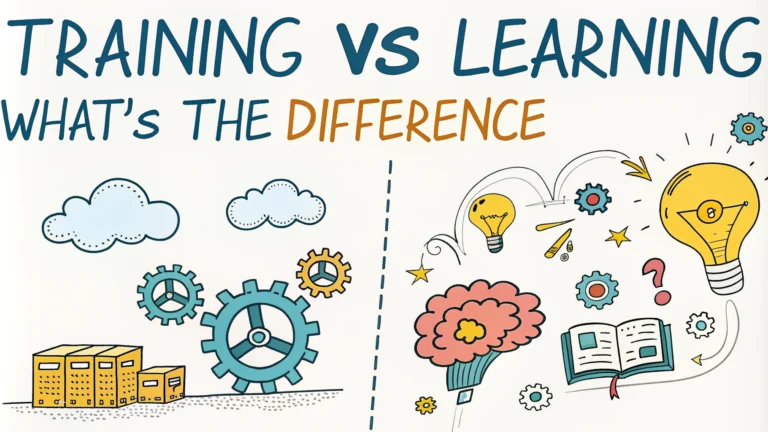The terms training and learning often get mixed up in professional and educational settings. While they’re connected, each serves a distinct purpose in personal and professional development.
Training focuses on specific skills and procedures, while learning encompasses broader knowledge acquisition and understanding. Knowing the differences helps organizations and individuals choose the right approach for their goals.
Key Characteristics of Training Programs
- Structured format with defined outcomes
- Skill-specific instruction methods
- Measurable results through assessments
- Time-bound sessions and modules
| Training Aspect | Primary Focus |
|---|---|
| Duration | Short-term, fixed timeline |
| Goals | Specific skill mastery |
| Assessment | Performance-based metrics |
The Learning Process Explained
- Continuous development over time
- Knowledge absorption through various methods
- Personal exploration and discovery
- Adaptive understanding of concepts
Practical Applications in Professional Development
Organizations need both training and learning strategies to build effective teams. Training programs address immediate skill gaps, while learning initiatives foster long-term growth.
“Training tells you how, learning tells you why.” – Professional Development Expert
Tracking Training Progress and Benchmarks
Success metrics differ between training and learning programs. Performance tracking requires specific tools and methods for each approach.
- Training benchmarks: Skills assessments, completion rates, certification results
- Learning indicators: Knowledge application, problem-solving ability, concept adaptation
| Metric Type | Measurement Method |
|---|---|
| Skills Development | Pre/post assessments |
| Knowledge Retention | Long-term application |
| Performance Impact | Productivity metrics |
Building an Effective Development Framework
A balanced approach combines structured training with ongoing learning opportunities. Focus on creating measurable objectives that align with both individual and organizational goals.
- Set clear milestones and deadlines
- Include both formal and informal learning activities
- Create feedback loops for continuous improvement
- Allow flexibility for different learning styles
Avoiding Common Development Mistakes
Many organizations make preventable errors in their development programs. Understanding these pitfalls helps create more effective learning environments.
- One-size-fits-all approaches
- Lack of follow-up support
- Insufficient practice time
- Missing performance feedback
“The biggest mistake is treating training as a one-time event rather than an ongoing process.” – Learning Development Specialist
Making Data-Driven Development Decisions
Success in professional development requires matching the right approach to specific needs. Use performance data and feedback to guide program selection and modification.
Action Steps for Implementation
- Assess current skill gaps
- Define clear success metrics
- Choose appropriate learning methods
- Monitor progress regularly
- Adjust programs based on results
Remember to maintain balance between immediate skill needs and long-term development goals. Regular review and adjustment of development plans ensures continued effectiveness and growth.
Training vs Learning FAQs
Frequently Asked Questions
Q: What is the main difference between training and learning?
A: Training is a structured, instructor-led process focused on specific skills or knowledge transfer, while learning is a broader, continuous process of acquiring knowledge that can happen formally or informally.
Q: Is corporate training more effective than self-learning?
A: Both have their merits. Corporate training provides structured guidance and measurable outcomes, while self-learning offers flexibility and personalized pacing. The effectiveness depends on the subject matter and individual learning style.
Q: What are the costs associated with training vs learning?
A: Training typically involves direct costs like:
- Instructor fees
- Materials
- Venue expenses
- Time off work
Self-learning often has lower direct costs but may require:
- Online course subscriptions
- Books
- Learning materials
Q: How long does it take to see results from training vs learning?
A: Training usually shows immediate results for specific skills, while learning is a gradual process with long-term benefits and deeper understanding.
Q: Which industries benefit most from formal training programs?
A: Industries requiring standardized procedures and compliance benefit most:
| Industry | Training Focus |
|---|---|
| Healthcare | Medical procedures |
| Manufacturing | Safety protocols |
| Aviation | Technical operations |
Q: Can learning replace formal training in the workplace?
A: Learning complements but cannot fully replace formal training, especially for roles requiring certification or standardized skills.
Q: What are the best methods for employee skill development?
A: A combination of:
- Structured training sessions
- On-the-job learning
- Mentorship programs
- Self-paced learning resources
Q: How do you measure ROI in training vs learning programs?
A: Training ROI is measured through specific performance metrics and skill assessments, while learning ROI often shows in improved problem-solving and adaptability.
Q: What role does technology play in modern training and learning?
A: Technology enables:
- Virtual training sessions
- E-learning platforms
- Mobile learning apps
- Performance tracking
- Interactive simulations
Q: How often should companies provide formal training?
A: Companies should offer formal training quarterly for compliance updates and annually for skill development, with continuous learning resources available year-round.
Q: What are the most effective online learning platforms for professional development?
A: Popular platforms include:
- LinkedIn Learning
- Coursera
- Udemy
- Skillsoft



















